Access MSUTR Data
Access MSUTR Data
We are very pleased to see the MSUTR being used by faculty at MSU and other institutions! We welcome inquiries from scientists interested in accessing the MSUTR for use in their own projects, whether as a resource for the identification and recruitment of participants or as a pre-existing source of data on health conditions, demographics, and behavioral characteristics of twins and their families.
Accessing The Registry
Researchers interested in using the registry are asked to submit a proposal that outlines the study aims, the target subject population, project timelines, and the resources needed. Proposals may be submitted for data analysis of existing data only, or for targeted recruitments from the registry. All proposals will be evaluated by the MSUTR Advisory Committee (Current members: Drs. Burt, Klump, Moser, and Paneth), particularly with regard to potential overlap in subject recruitment with other projects. Once approval is received, access to the data will be granted or the recruitment process will begin, depending on the needs of each investigator. However, please note that any data shared by the MSUTR will have personally identifying information removed, and any twins selected for recruitment into another study will be anonymous to the recruiting researchers until such time as they choose to participate in that study.
MSUTR Data Use Proposal Form - Analysis of existing data only
MSUTR Data Collection Proposal Form - New data collection/recruitment
Recruitment Overview
Twins may be selected for recruitment based on age, sex, twin type, and development status, in addition to the screening items listed on the health survey (please see below for a partial list). Recruitment mailings to the selected twins will be prepared by MSUTR staff and delivered to the Michigan Department of Health and Human Services (MDHHS) for mailing, as the MDHHS houses vital records and address information for MSUTR twins. These customized mailings include basic information about the recruiting study and provide instructions for twins/families to indicate their interest in participation through the return of postage-paid postcards included in each mailing.
A series of four recruitment mailings are sent per twin/family, with the fourth mailing using certified letters. Mailings are timed approximately 4-6 weeks apart, until all four mailings have been sent. All four mailings must be completed (to those with no response), and all twins/families who express interest in the study and are eligible must be allowed the opportunity to participate, even if the target sample size for the project has been reached. Thus, the sample size chosen for each mailing series should account for each of the four mailings, and the budget should be planned accordingly. These policies help promote a positive relationship with twins/families and provide consistency across studies, allowing for comparable response rates.
MSUTR staff prepare and facilitate the recruitment mailings, including printing recruitment materials, assembling recruitment packets, and delivering the packets to the MDHHS for mailing. MSUTR staff work closely with both the outside study staff and MDHHS staff to provide updates, make adjustments as necessary, and ensure the mailings go out on schedule and according to specifications.
Notably, the MSUTR staff only facilitate the recruitment mailings; they are not involved in the contacting of twins to determine study eligibility, schedule assessments, etc. All direct contact and data collection with the twins/families are done by the outside, primary study investigators. Thus, once twins have indicated an interest in participation, the investigators of the study (not MSUTR staff) contact interested twins/families and proceed with study recruitment and assessments.
For studies that do not require in-person participation, the study questionnaire could be included with the initial recruitment mailings for participants to complete and return at their discretion. Any such questionnaires must be provided by the outside, primary study staff for inclusion in the mailings, and they must be returned directly to the primary investigators.
Studies recruiting from the MSUTR have observed excellent response rates (57-86%; mean response rate is 70%) that include subjects who are representative of the state of Michigan in terms of racial/ethnic background and socioeconomic status (see Burt & Klump (2013) paper: doi:10.1017/thg.2012.87).
Partial List of Screening Items:
ADHD
Alcoholism
Anxiety Disorders
Asthma
Autism
Bipolar Disorder
Cancer
Cerebral Palsy
Conduct Disorder
Depression
Diabetes
Drug Abuse
Eating Disorders
Heart Problems
Learning Disabilities
Schizophrenia
Stuttering
Registry Access Fees
In order to cover expenses associated with subject selection and recruitment mailings, each project recruiting from the registry will be charged a Registry Access fee. This fee covers the cost of mailing preparation, all mailing expenses (including a certified, fourth mailing), and staff time at both MSU and MDHHS. Please note that costs are higher for the recruitment of adult than child twins since adult recruitment requires mailing two separate recruitment packets (one to each adult twin) whereas recruitment of child/adolescent pairs requires only one packet sent to the twins’ parents.
Contact Us
If you would be interested in accessing the MSUTR for use in your own project, or you would like to learn more about the MSUTR, please contact either of the MSUTR Directors: Dr. S. Alexandra Burt (burts@msu.edu) and Dr. Kelly Klump (klump@msu.edu).

